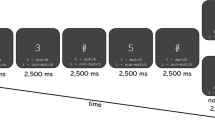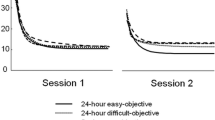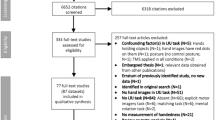Abstract
Force steadiness can be influenced by visual feedback as well as presence of a cognitive tasks and potentially differs with age and sex. This study determined the impact of altered visual feedback on force steadiness in the presence of a difficult cognitive challenge in young and older men and women. Forty-nine young (19–30 yr; 25 women, 24 men) and 25 older (60–85 yr; 15 women; 10 men) performed low force (5% of maximum) static contractions with the elbow flexor muscles in the presence and absence of a cognitive challenge (counting backwards by 13) either with low or high visual feedback gain. The cognitive challenge reduced force steadiness (increased force fluctuation amplitude) particularly in women (cognitive challenge × sex: P < 0.05) and older individuals (cognitive challenge × age: P < 0.05). Force steadiness improved with high-gain visual feedback compared with low-gain visual feedback (P < 0.01) for all groups (all interactions: P > 0.05). Manipulation of visual feedback had no influence on the reduced force steadiness in presence of the cognitive challenge for all groups (all P > 0.05). These findings indicate that older individuals and women have greater risk of impaired motor performance of the upper extremity if steadiness is required during a low-force static contraction. Manipulation of visual feedback had minimal effects on the reduced force steadiness in presence of a difficult cognitive challenge.


Similar content being viewed by others
Data availability
The de-identified datasets generated and used for analysis in the current study are available from the corresponding author on reasonable request.
References
Almuklass AM, Price RC, Gould JR, Enoka RM (2016) Force steadiness as a predictor of time to complete a pegboard test of dexterity in young men and women. J Appl Physiol (1985) 120:1410–1417. https://doi.org/10.1152/japplphysiol.01051.2015
Christou EA (2005) Visual feedback attenuates force fluctuations induced by a stressor. Med Sci Sports Exerc 37:2126–2133
Christou EA (2011) Aging and variability of voluntary contractions. Exerc Sport Sci Rev 39:77–84
Christou EA, Jakobi JM, Critchlow A, Fleshner M, Enoka RM (2004) The 1- to 2-Hz oscillations in muscle force are exacerbated by stress, especially in older adults. J Appl Physiol 97:225–235
Enoka RM, Farina D (2021) Force steadiness: from motor units to voluntary actions. Physiology (Bethesda) 36:114–130. https://doi.org/10.1152/physiol.00027.2020
Enoka RM, Christou EA, Hunter SK, Kornatz KW, Semmler JG, Taylor AM, Tracy BL (2003) Mechanisms that contribute to differences in motor performance between young and old adults. J Electromyogr Kinesiol 13:1–12
Fox EJ, Baweja HS, Kim C, Kennedy DM, Vaillancourt DE, Christou EA (2013) Modulation of force below 1 Hz: age-associated differences and the effect of magnified visual feedback. PLoS ONE 8:e55970
Fox SI (2003) Human Physiology. The MacGraw-Hill Companies
Galganski ME, Fuglevand AJ, Enoka RM (1993) Reduced control of motor output in a human hand muscle of elderly subjects during submaximal contractions. J Neurophysiol 69:2108–2115
Heckman CJ, Hyngstrom AS, Johnson MD (2008) Active properties of motoneurone dendrites: diffuse descending neuromodulation, focused local inhibition. J Physiol 586:1225–1231. https://doi.org/10.1113/jphysiol.2007.145078
Heintz Walters B, Huddleston WE, O’Connor K, Wang J, Hoeger Bement M, Keenan KG (2023) Visual feedback and declines in attention are associated with altered visual strategy during a force-steadiness task in older adults. J Neurophysiol. https://doi.org/10.1152/jn.00486.2022
Jakobi JM, Haynes EMK, Smart RR (2018) Is there sufficient evidence to explain the cause of sexually dimorphic behaviour in force steadiness? Appl Physiol Nutr Metab 43:1207–1214. https://doi.org/10.1139/apnm-2018-0196
Jenz ST, Beauchamp JA, Gomes MM, Negro F, Heckman CJ, Pearcey GEP (2023) Estimates of persistent inward currents in lower limb motoneurons are larger in females than in males. J Neurophysiol 129:1322–1333. https://doi.org/10.1152/jn.00043.2023
Johnson AN, Shinohara M (2012) Corticomuscular coherence with and without additional task in the elderly. J Appl Physiol 112:970–981
Johnson AN, Wheaton LA, Shinohara M (2011) Attenuation of corticomuscular coherence with additional motor or non-motor task. Clin Neurophysiol 122:356–363
Kajantie E, Phillips DI (2006) The effects of sex and hormonal status on the physiological response to acute psychosocial stress. Psychoneuroendocrinology 31:151–178
Keenan KG, Massey WV, Walters TJ, Collins JD (2012) Sensitivity of EMG-EMG coherence to detect the common oscillatory drive to hand muscles in young and older adults. J Neurophysiol 107:2866–2875
Keller-Ross ML, Pereira HM, Pruse J, Yoon T, Schlinder-Delap B, Nielson KA, Hunter SK (2014) Stress-induced increase in muscle fatigability of young men and women is predicted by strength but not voluntary activation. J Appl Physiol (1985) 116:767–778
Kennedy DM, Christou EA (2011) Greater amount of visual information exacerbates force control in older adults during constant isometric contractions. Exp Brain Res 213:351–361
Kornatz KW, Christou EA, Enoka RM (2005) Practice reduces motor unit discharge variability in a hand muscle and improves manual dexterity in old adults. J Appl Physiol (1985) 98:2072–2080
Kriska AM, Bennett PH (1992) An epidemiological perspective of the relationship between physical activity and NIDDM: from activity assessment to intervention. Diabetes Metab Rev 8:355–372
Laine CM, Yavuz SU, Farina D (2014) Task-related changes in sensorimotor integration influence the common synaptic input to motor neurones. Acta Physiol (Oxf) 211:229–239
Lorist MM, Kernell D, Meijman TF, Zijdewind I (2002) Motor fatigue and cognitive task performance in humans. J Physiol 545:313–319
Mani D, Feeney DF, Enoka RM (2019) The modulation of force steadiness by electrical nerve stimulation applied to the wrist extensors differs for young and older adults. Eur J Appl Physiol 119:301–310. https://doi.org/10.1007/s00421-018-4025-6
Marmon AR, Pascoe MA, Schwartz RS, Enoka RM (2011) Associations among strength, steadiness, and hand function across the adult life span. Med Sci Sports Exerc 43:560–567
Mello EM, Magalhaes FH, Kohn AF (2013) Larger plantar flexion torque variability implies less stable balance in the young: an association affected by knee position. Hum Mov Sci 32:1310–1324. https://doi.org/10.1016/j.humov.2013.05.004
Mesquita RNO, Taylor JL, Trajano GS, Holobar A, Goncalves BAM, Blazevich AJ (2023) Effects of jaw clenching and mental stress on persistent inward currents estimated by two different methods. Eur J Neurosci 58:4011–4033. https://doi.org/10.1111/ejn.16158
Negro F, Holobar A, Farina D (2009) Fluctuations in isometric muscle force can be described by one linear projection of low-frequency components of motor unit discharge rates. J Physiol 587:5925–5938
Noteboom JT, Fleshner M, Enoka RM (2001) Activation of the arousal response can impair performance on a simple motor task. J Appl Physiol 91:821–831
Oldfield RC (1971) The assessment and analysis of handedness: the edinburgh inventory. Neuropsychologia 9:97–113
Oomen NM, van Dieen JH (2017) Effects of age on force steadiness: a literature review and meta-analysis. Ageing Res Rev 35:312–321. https://doi.org/10.1016/j.arr.2016.11.004
Orssatto LBR, Fernandes GL, Blazevich AJ, Trajano GS (2022) Facilitation-inhibition control of motor neuronal persistent inward currents in young and older adults. J Physiol 600:5101–5117. https://doi.org/10.1113/JP283708
Pereira HM, Hunter SK (2023) Cognitive challenge as a probe to expose sex- and age-related differences during static contractions. Front Physiol 14:1166218. https://doi.org/10.3389/fphys.2023.1166218
Pereira HM, Spears VC, Schlinder-Delap B et al (2015a) Sex differences in arm muscle fatigability with cognitive demand in older adults. Clin Orthop Relat Res 473:2568–2577. https://doi.org/10.1007/s11999-015-4205-1
Pereira HM, Spears VC, Schlinder-Delap B, Yoon T, Nielson KA, Hunter SK (2015b) Age and sex differences in steadiness of elbow flexor muscles with imposed cognitive demand. Eur J Appl Physiol 115:1367–1379. https://doi.org/10.1007/s00421-015-3113-0
Pereira HM, Schlinder-Delap B, Nielson KA, Hunter SK (2018) Force steadiness during a cognitively challenging motor task is predicted by executive function in older adults. Front Physiol 9:1316. https://doi.org/10.3389/fphys.2018.01316
Pereira HM, Schlinder-DeLap B, Keenan KG et al (2019) Oscillations in neural drive and age-related reductions in force steadiness with a cognitive challenge. J Appl Physiol (1985). https://doi.org/10.1152/japplphysiol.00821.2018
Shortz AE, Mehta RK (2017) Cognitive challenges, aging, and neuromuscular fatigue. Physiol Behav 170:19–26. https://doi.org/10.1016/j.physbeh.2016.11.034
Shortz AE, Pickens A, Zheng Q, Mehta RK (2015) The effect of cognitive fatigue on prefrontal cortex correlates of neuromuscular fatigue in older women. J Neuroeng Rehabil 12:115. https://doi.org/10.1186/s12984-015-0108-3
Sosnoff JJ, Newell KM (2006) Information processing limitations with aging in the visual scaling of isometric force. Exp Brain Res 170:423–432
Spielberger CD, Gorsuch RL, Lushene PR, Vagg PR, Jacobs AG (1970) Manual for the State-Trait Anxiety Inventory (Self-evaluation questionnaire). Consulting Psychologists Press, Palo Alto, CA
Thompson CK, Negro F, Johnson MD et al (2018) Robust and accurate decoding of motoneuron behaviour and prediction of the resulting force output. J Physiol 596:2643–2659. https://doi.org/10.1113/JP276153
Tracy BL (2007) Visuomotor contribution to force variability in the plantarflexor and dorsiflexor muscles. Hum Mov Sci 26:796–807
Tracy BL, Dinenno DV, Jorgensen B, Welsh SJ (2007) Aging, visuomotor correction, and force fluctuations in large muscles. Med Sci Sports Exerc 39:469–479. https://doi.org/10.1249/mss.0b013e31802d3ad3
Vanden Noven ML, Pereira HM, Yoon T, Stevens AA, Nielson KA, Hunter SK (2014) Motor variability during sustained contractions increases with cognitive demand in older adults. Front Aging Neurosci 6:97. https://doi.org/10.3389/fnagi.2014.00097
Voelcker-Rehage C, Stronge AJ, Alberts JL (2006) Age-related differences in working memory and force control under dual-task conditions. Neuropsychol Dev Cogn B Aging Neuropsychol Cogn 13:366–384
Welsh SJ, Dinenno DV, Tracy BL (2007) Variability of quadriceps femoris motor neuron discharge and muscle force in human aging. Exp Brain Res 179:219–233
Funding
College of Arts and Sciences, University of Oklahoma, National Institute on Aging, R21-AG-045766, Sandra K Hunter
Author information
Authors and Affiliations
Contributions
All authors contributed to the study conception and design. Material preparation, data collection and analysis were performed by HMP. The first draft was written by HMP, and all authors provided comments on the manuscript. All authors read and approved the final manuscript.
Corresponding author
Ethics declarations
Conflict of interest
On behalf of all authors, the corresponding author states that there is no conflict of interest.
Additional information
Communicated by Francesco Lacquaniti.
Publisher's Note
Springer Nature remains neutral with regard to jurisdictional claims in published maps and institutional affiliations.
Rights and permissions
Springer Nature or its licensor (e.g. a society or other partner) holds exclusive rights to this article under a publishing agreement with the author(s) or other rightsholder(s); author self-archiving of the accepted manuscript version of this article is solely governed by the terms of such publishing agreement and applicable law.
About this article
Cite this article
Pereira, H.M., Keenan, K.G. & Hunter, S.K. Influence of visual feedback and cognitive challenge on the age-related changes in force steadiness. Exp Brain Res (2024). https://doi.org/10.1007/s00221-024-06831-w
Received:
Accepted:
Published:
DOI: https://doi.org/10.1007/s00221-024-06831-w




